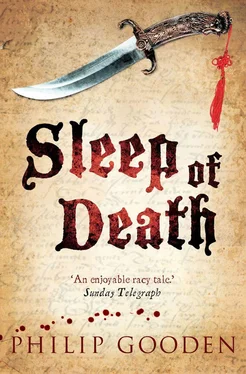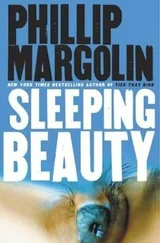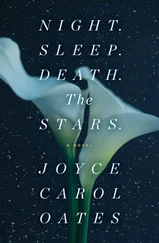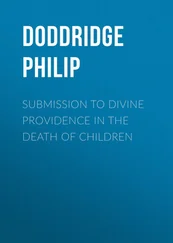Philip Gooden - Sleep of Death
Здесь есть возможность читать онлайн «Philip Gooden - Sleep of Death» весь текст электронной книги совершенно бесплатно (целиком полную версию без сокращений). В некоторых случаях можно слушать аудио, скачать через торрент в формате fb2 и присутствует краткое содержание. Год выпуска: 0101, ISBN: 0101, Издательство: Constable & Robinson, Жанр: Исторический детектив, на английском языке. Описание произведения, (предисловие) а так же отзывы посетителей доступны на портале библиотеки ЛибКат.
- Название:Sleep of Death
- Автор:
- Издательство:Constable & Robinson
- Жанр:
- Год:0101
- ISBN:9781472104311
- Рейтинг книги:5 / 5. Голосов: 1
-
Избранное:Добавить в избранное
- Отзывы:
-
Ваша оценка:
- 100
- 1
- 2
- 3
- 4
- 5
Sleep of Death: краткое содержание, описание и аннотация
Предлагаем к чтению аннотацию, описание, краткое содержание или предисловие (зависит от того, что написал сам автор книги «Sleep of Death»). Если вы не нашли необходимую информацию о книге — напишите в комментариях, мы постараемся отыскать её.
Sleep of Death — читать онлайн бесплатно полную книгу (весь текст) целиком
Ниже представлен текст книги, разбитый по страницам. Система сохранения места последней прочитанной страницы, позволяет с удобством читать онлайн бесплатно книгу «Sleep of Death», без необходимости каждый раз заново искать на чём Вы остановились. Поставьте закладку, и сможете в любой момент перейти на страницу, на которой закончили чтение.
Интервал:
Закладка:
‘Is it Master Thomas Nashe?’ I said, all innocence and guile wrapped up together. ‘Is it he?’
‘Oh no, not Nashe,’ said Mink, not yet ready to reveal his hand.
‘Well’ — I pretended to flail about for a suitable name — ‘it is Master Shirley then.’
‘Nor him neither.’
‘Marlowe? It had just a trace to my ears of “Come live with me and be my love” — as the passionate shepherd says to his inamorata.’
It had no such thing, of course, but Master Mink was inordinately pleased to have his versifying likened to one of the most famous poems of our time. I could see, even in the tavern darkness that swathed us, his bulk swell up with the pleasure of it all. Deciding, perhaps, that he was unlikely to top Kit Marlowe for comparisons, he decided to own up.
‘I am no Kit Marlowe,’ he said, though it was plain from his slight smirk — which I could not so much see in his face, as hear in his words — that he considered himself not so inferior. ‘Though it may be that I am as much of a passionate shepherd.’
I could not square the man of soft feelings and elevated opinion with the impatient figure who had crushed and burnt poor Gilbert’s hand; nevertheless, I continued to play my part.
‘They are your lines?’
Nicely done, Nicholas, I thought, in its admixture of surprise and no-surprise.
‘A poor thing but mine own.’
‘Oh not poor, Robert, but rich.’
But something about my quick and facile rejoinder, coupled perhaps with my ready use of Master Mink’s given name, roused his suspicions. No one is so quick to take offence as he who is easily flattered. He returned the sheaf of papers to his ample doublet.
‘You do not mean it.’
‘I do, believe me.’
‘You do not mean it and I do not believe you. No matter, Master Revill.’
He spoke mildly, yet I already had witnessed enough of Mink’s mildness and what it might be a prelude to. Fortunately, he now gave me my dismissal for the time being.
‘You have business to attend to, you said. Another evening, and you may hear The Lover’s Triumph.’
‘I am at your service,’ I said, already rising from the table.
Outside, the cobbles of Moor Street were slimy with the rain that still fell, as steady and remorseless as Master Mink’s verses.
Scene: The next day. The house of Sir Thomas and Lady Alice Eliot. During supper the conversation turns to plays and players, in particular the value of the company clown.
William Eliot: You have Robert Armin with you now, don’t you? In the Chamberlain’s Company?
Nick Revill: As successor to Will Kempe, yes. Armin is our clown and so the heir to Kempe’s bauble, his thing.
Lady Alice: It was not such a little thing, Kempe’s, unless I have been misinformed.
Sir Thomas: Kempe the jig-maker. Your only jig-maker.
Lady Alice: He jigged his way across more country than lies between here and Norwich, and more than country, I’ll be bound.
William Eliot: ‘Successor’ and ‘heir’ are grand words for the company clown, though from the way that he spoke them I don’t think Nick approves of the trade.
Nick: I wouldn’t say this beyond these walls, but I don’t believe clowns and suchlike are an ornament to the profession.
Sir Thomas: Profession, ha!
Nick: With respect, sir, that is exactly the reason why companies need to be careful in selecting their clown.
Sir Thomas: Explain.
Nick: We are no longer a bunch of tatterdemallions setting ourselves up on a wooden cart in some draughty inn-yard, there to play peekaboo with the Devil and God and Everyman, in a creaking Morality of vice and virtue. We are the voice of our age. We are the mirror of the times. We inhabit one of the finest buildings in the greatest city the world has ever seen, and in our little Globe is the greater globe contained, in all her passion and splendour and, yes, sometimes in her squalor too.
William: Well done, Nick! Some more wine?
Sir Thomas: Clowns surely have their place too in all this splendour and squalor?
Nick: But it is in the nature of the clowns to break bounds, to flow over their banks, to obscure the face of the play with their meaningless torrent of words and gestures. I believe that is one reason for Armin joining the Chamberlain’s and Kempe leaving us. Armin is less. . broad.
Sir Thomas: Oh, if you want broadness then I remember Tarlton back in the eighties. He was the one, a small hunched fellow with a squashed nose. He’d jig and he’d rhyme and do his faces, and then turn about and shake his arse at the crowd as if he was going to fart at them.
Lady Alice: Oh yes! And you have heard the story told of a lady that once offered to cuff him. . because he was so impudent to her face.
Sir Thomas: What’s that, my dear? Tell us.
William: He struck at her first?
Lady Alice: He was sharper than that. Words before blows. He agreed to the cuff — but only on condition she reversed the spelling.
Sir Thomas: Tarlton was the one, there is no doubt about it. There has never been a clown to match him. Tell me, Nick, you’re the insider. It’s not just my age but our clowns have grown more sedate. They roar less than they used, do they not? And, from what you’ve been saying, you must approve of this change.
Nick: What Master Richard Burbage calls the congregation loves them still, unfortunately, but they are no friends to our authors. The playwrights are of my mind, I think. They would muzzle them. Clowns hold the words of others very cheap indeed, and think nothing of mangling whatever the authors provide.
William: ‘Let those that play your clowns speak no more than is set down for them’.
Nick: As the Prince says.
Lady Alice: Prince who?
William: The Prince of Denmark, mother.
Lady Alice: Oh, him.
William: Hamlet is giving advice to the players before they perform in front of the King and Queen at Elsinore, if you remember. He has a message that he wishes conveyed to his mother and step-father and he doesn’t want the royal court distracted by zanies.
Nick: Though Hamlet speaks also out of a feeling for the players and their art, surely?
Sir Thomas: Art, ho!
Lady Alice: I don’t like that play about Denmark. They all talk so much.
Sir Thomas: It was a painful experience for us to watch, as you may imagine, Nick.
Nick: I — yes, I — it must have been.
Sir Thomas: Here was a man done to death by his brother — and dying in an orchard too — with the brother marrying the grieving widow. My own brother goes to his eternal rest. Lady Alice and I go to the Globe for some recreation, a little diversion, the latest piece by Master Shakespeare, and what do we find? That some of the outward circumstances of our lives have been shadowed forth on the stage.
William: But what of that, uncle? Our withers are unwrung.
Lady Alice: Unwrung withers, William?
Sir Thomas: A line from the play, my dear.
Lady Alice: Dear William knows that play so well.
William: It bears study, mother.
Sir Thomas: If I was of a suspicious cast of mind I would consider that Shakespeare had borrowed our clothes to flaunt himself in front of the public. That he was profiting from Lady Alice’s widow’s weeds.
William: Pure coincidence. The sad loss of my father and of your husband, madam, and your brother, sir, must have occurred even as the author was writing. The idea is not his, in any case. There is an older play of Hamlet, by somebody or other. No author worth his salt is going to use real life when there are so many books and plays to borrow from.
Lady Alice: What is he like, Master Revill? Master Shakespeare, who is he? Is he greedy and unscrupulous, ready to exploit a private tragedy? I have heard that he would be a gentleman but that he combines that wish with a hard head for business.
Читать дальшеИнтервал:
Закладка:
Похожие книги на «Sleep of Death»
Представляем Вашему вниманию похожие книги на «Sleep of Death» списком для выбора. Мы отобрали схожую по названию и смыслу литературу в надежде предоставить читателям больше вариантов отыскать новые, интересные, ещё непрочитанные произведения.
Обсуждение, отзывы о книге «Sleep of Death» и просто собственные мнения читателей. Оставьте ваши комментарии, напишите, что Вы думаете о произведении, его смысле или главных героях. Укажите что конкретно понравилось, а что нет, и почему Вы так считаете.












